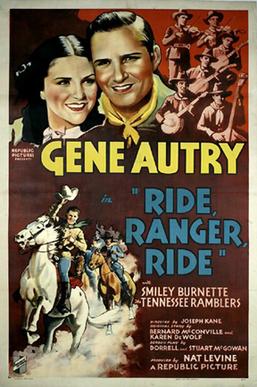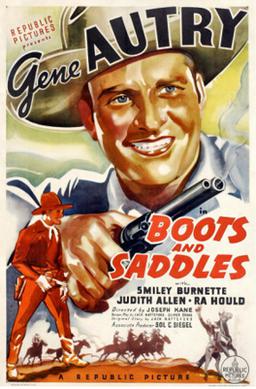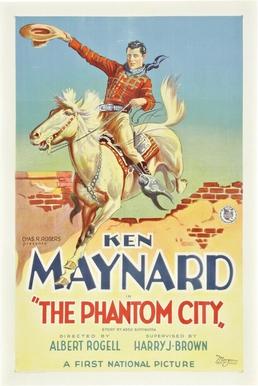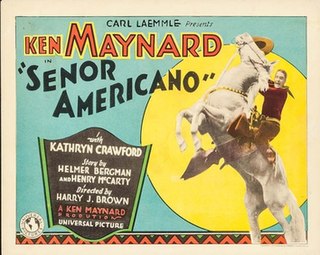
Leon Schlesinger was an American film producer who founded Leon Schlesinger Productions, which later became the Warner Bros. Cartoons studio, during the Golden Age of American animation. He was a distant relative of the Warner Brothers. As head of his own studio, Schlesinger served as the producer of Warner's Looney Tunes and Merrie Melodies cartoons from 1930, when Schlesinger assumed production from his subcontractors, Harman and Ising, to 1944, when Warner acquired the studio.

Kenneth Olin Maynard was an American actor and producer. He was mostly active from the 1920s to the 1940s and considered one of the biggest Western stars in Hollywood.

The Phantom Empire is a 1935 American Western serial film directed by Otto Brower and B. Reeves Eason and starring Gene Autry, Frankie Darro, and Betsy King Ross. This 12-chapter Mascot Pictures serial combined the Western, musical and science-fiction genres. The duration of the first episode is 30 minutes, while that of the rest is about 20 minutes. The serial film is about a singing cowboy who stumbles upon an ancient subterranean civilization living beneath his own ranch that becomes corrupted by unscrupulous greedy speculators from the surface. In 1940, a 70-minute feature film edited from the serial was released under the titles Radio Ranch or Men with Steel Faces. This was Gene Autry's first starring role, playing himself as a singing cowboy. It is considered to be the first science-fiction Western.

A singing cowboy was a subtype of the archetypal cowboy hero of early Western films. It references real-world campfire side ballads in the American frontier. The original cowboys sang of life on the trail with all the challenges, hardships, and dangers encountered while pushing cattle for miles up the trails and across the prairies. This continues with modern vaquero traditions and within the genre of Western music, and its related New Mexico, Red Dirt, Tejano, and Texas country music styles. A number of songs have been written and made famous by groups like the Sons of the Pioneers and Riders in the Sky and individual performers such as Marty Robbins, Gene Autry, Roy Rogers, Tex Ritter, Bob Baker and other "singing cowboys". Singing in the wrangler style, these entertainers have served to preserve the cowboy as a unique American hero.

Jasper Joseph Inman Kane was an American film director, film producer, film editor and screenwriter. He is best known for his extensive directorship and focus on Western films.

Riders of Destiny is a 1933 pre-Code Western musical film starring 26-year-old John Wayne as Singin' Sandy Saunders, the screen's second singing cowboy. It was the first of a series of sixteen Lone Star Westerns made for Monogram Pictures between 1933 and 1935, by Wayne and director Robert N. Bradbury, and the first pairing of Wayne with George "Gabby" Hayes.

In Old Santa Fe is a 1934 American Western film directed by David Howard, starring Ken Maynard, George "Gabby" Hayes and Evalyn Knapp and featuring the first screen appearance of Gene Autry, singing a bluegrass rendition of "Wyoming Waltz" accompanied by his own acoustic guitar with Smiley Burnette on accordion. Autry and Burnette were uncredited, but the scene served as a screen test for the duo for subsequent singing cowboy films, beginning with The Phantom Empire (1935), in which Autry had his first leading role.

Mystery Mountain is a 1934 American Western serial film directed by Otto Brower and B. Reeves Eason and starring Ken Maynard, Verna Hillie, Syd Saylor, Edward Earle, and Hooper Atchley. Distributed by Mascot Pictures, Mystery Mountain features the second ever film appearance by Gene Autry.

Mascot Pictures Corporation was an American film company of the 1920s and 1930s, best known for producing and distributing film serials and B-westerns. Mascot was formed in 1927 by film producer Nat Levine. In 1935, it merged with several other companies to form Republic Pictures.

Clifford William Lyons was an American film actor, stuntman and second unit director, primarily of Westerns and particularly the films of John Ford and John Wayne. His Hollywood contemporaries were unanimous in describing him as “a driven taskmaster”.

Tumbling Tumbleweeds is a 1935 American Western film directed by Joseph Kane and starring Gene Autry, Smiley Burnette, and Lucile Browne. Written by Ford Beebe, the film is about a cowboy who returns home after a five-year absence to find his father murdered and his boyhood pal accused of the dastardly deed. Tumbling Tumbleweeds features the songs "Riding Down the Canyon", "That Silver-Haired Daddy of Mine", and the Bob Nolan classic "Tumbling Tumbleweeds".

Eddie Dean was an American Western singer and actor. His smooth baritone impressed both Roy Rogers and Gene Autry, who considered Dean the best cowboy singer of all time.

The Old Corral is a 1936 American Western film directed by Joseph Kane and starring Gene Autry, Smiley Burnette, and Irene Manning. Based on a story by Bernard McConville, the film is about a sheriff of a small western town who sings his way into a relationship with a singer from a Chicago nightclub who earlier witnessed a murder. The supporting cast features Lon Chaney Jr. and Roy Rogers.

Ride Ranger Ride is a 1936 American Western film directed by Joseph Kane and starring Gene Autry, Smiley Burnette, and Kay Hughes. Based on a story by Bernard McConville and Karen DeWolf, and a screenplay by Dorrell and Stuart E. McGowan, the film is about a Texas Ranger working undercover to protect an Army wagon train full of ammunition and supplies. The Army doesn't believe him at first, until the Comanche arrive.

The phrase Wonder Horses refers to the equine companions of cowboy heroes in early Western films. What makes these horses different from others that have appeared on the silver screen is their rise from trusty steed to a genuine screen personality. A number of horses have enjoyed such fame, often receiving equal or second billing with their human costars.

The Singing Cowboy is a 1936 American Western film directed by Mack V. Wright and starring Gene Autry, Smiley Burnette, Lois Wilde and Lon Chaney Jr. Based on a story by Tom Gibson, the film is about a cowboy who decides to sing on television in order to raise money for the orphaned daughter of his former boss who was murdered.

Boots and Saddles is a 1937 American western film directed by Joseph Kane and starring Gene Autry, Smiley Burnette and Judith Allen. It was produced and distributed by Republic Pictures. Based on a story by Jack Natteford, the film is about a young Englishman who inherits a ranch that he wants to sell, but is turned into a real Westerner by a singing cowboy.

Cheyenne is a lost 1929 American sound Western film directed by Albert S. Rogell and written by Bennett Cohen, Marion Jackson and Don Ryan. While the film has no audible dialog, it was released with a synchronized musical score with sound effects using the Vitaphone sound-on-disc sound process. The film stars Ken Maynard, Gladys McConnell, James Bradbury Jr., Billy Franey and Slim Whitaker. The film was released by Warner Bros. on February 3, 1929.

The Phantom City is a 1928 American silent Western film directed by Albert S. Rogell and written by Adele Buffington and Fred Allen. The film stars Ken Maynard, Eugenia Gilbert, James Mason, Charles Hill Mailes, Jack McDonald and Blue Washington. The film was released on December 23, 1928, by First National Pictures.

Señor Americano is a 1929 American sound part-talkie western film directed by Harry Joe Brown and starring Ken Maynard, Kathryn Crawford and Frank Beal. While the film has a few talking sequences, the majority of the film featured a synchronized musical score with sound effects. It was distributed by Universal Pictures. Produced during the transition to sound, it was released in both sound and silent versions.





















